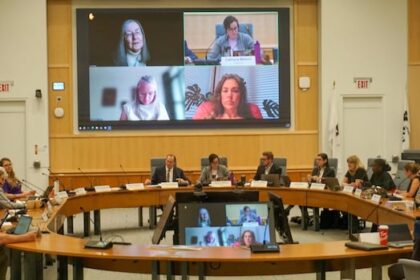IndigenousThe federal government is fighting a First Nations grandmother in court to try and alter years of legal orders forcing Canada to provide First Nations kids with equal access to vital services under Jordan’s Principle, the woman’s lawyers say.Case will be the first time the Federal Court of Appeal has considered the principleBrett Forester · CBC News · Posted: Oct 06, 2025 4:00 AM EDT | Last Updated: October 6A photo of Joanne Powless’s bathroom ceiling and walls which shows extensive mould was submitted as part of court records. (Submitted by David Taylor)The Carney government is fighting a First Nations grandmother in court to try and alter years of legal orders requiring Canada to provide First Nations kids with equal access to vital health care and social services, the woman’s lawyers say.The Federal Court of Appeal is hearing this precedent-setting case on Monday in Ottawa — the first time the appeal court will consider Jordan’s Principle, a legal rule that requires governments provide First Nations kids with the care they need without delays linked to jurisdictional disputes.The principle was defined in a string of Canadian Human Rights Tribunal (CHRT) decisions beginning in 2016, and according to lawyers for Oneida grandmother Joanne Powless, Canada’s case is basically just a backdoor attack on those long-standing orders.”Canada seeks to re-litigate issues the CHRT has already resolved, and effectively mounts a collateral attack on a decade’s worth of CHRT orders,” said lawyers David Taylor and Siobhan Morris, of Conway Baxter Wilson, in a Sept. 25 written argument.Taylor said in an interview Friday that those court-like tribunal orders are final and binding, and Canada has never successfully challenged any of them.”They’re trying to get indirectly what they didn’t get directly from the tribunal,” he said.The outcome of this one-day hearing could have far-reaching ramifications for more than 100,000 unprocessed applications queued up in a backlog at Indigenous Services Canada (ISC).”It would have a very serious and adverse effect on many kids” if Canada were to prevail, while if Powless succeeds it would only add to the dozens of decisions Canada has already lost, said Cindy Blackstock, executive director of the First Nations Child and Family Caring Society, which has intervened in the appeal.In 2022, Powless applied for about $200,000 via Jordan’s Principle to fix her mould-infested home on Oneida Nation of the Thames near London, Ont. She also sought money for temporary relocation, food and personal hygiene costs during the repairs.Powless is the primary caregiver for her two grandchildren, who live with her, and their doctor concluded the remediation work was “a life-saving necessity” for the sisters, who have asthma caused and exacerbated by their living conditions, court papers say.But Canada denied the requests on the grounds that major home renovations are outside Jordan’s Principle’s scope. Powless applied successfully for judicial review in Federal Court, where a judge found ISC took an unreasonably narrow approach by framing the application purely as a housing remediation request.Instead, the court found Jordan’s Principle requires government officials to assess each request based on the unique health needs and best interest of each child with an eye to achieving substantive equality. Powless is the the legal guardian and primary caregiver for the children. Their doctor has warned of ‘lifelong consequences’ if the mould contamination is not addressed. (Submitted by Joanne Powless)Canada now argues the Federal Court made overriding legal errors. Justice Department lawyers say there can be no discrimination because there is no gap in services.”There is no existing program anywhere in Canada that would fund the mould remediation and renovation work sought,” Canada said in a Sept. 12 written argument.”Jordan’s Principle is neither intended to, nor capable of, addressing the problem of inadequate housing on-reserve or all the needs of First Nations children when there is no other service provided,” the government added in a supplementary argument filed Oct. 2.Blackstock’s society, a nonprofit organization that started the initial human rights complaint alongside the Assembly of First Nations in 2007, disagrees.”We don’t want to see those children end up in child welfare care and this is exactly what Jordan’s Principle was intended to address,” Blackstock said in an interview after watching Monday morning’s arguments.”Canada has repeatedly denied these children the ability to basically breathe. It’s crazy to me.”A spokesperson for Indigenous Services Minister Mandy Gull-Masty responded to a request for comment on Friday by saying the department would be better placed to comment than the minister. The department said in a statement that the Federal Court’s decision raises “important legal issues” that need to be resolved.”The appeal is about clarifying the scope of Jordan’s Principle, consistent with the CHRT rulings, to ensure that Jordan’s Principle can sustainably provide First Nations children with access to the services they urgently need,” wrote spokesperson Carolane Gratton.Monday’s hearingDuring spoken arguments Monday, Justice Canada lawyer Christine Mohr focused heavily on Ottawa’s position that “Jordan’s Principle only applies when there is a discriminatory gap in an existing service,” making it reasonable for ISC to deny the request. One of the judges on the three-person appeal panel said they were “struggling” with this issue, and the judges questioned Taylor persistently when he rose to argue. He said Canada is still required to consider requests even when there is no existing service and that Canada is downplaying the severity of its discrimination.Taylor and Morris’s written argument said, “ISC’s decision is consistent with a troubling pattern, documented in several of the CHRT’s decisions, of Canada sidestepping or unduly narrowing the scope of Jordan’s Principle.”The Assembly of Manitoba Chiefs, representing 63 First Nations, also intervened. In brief submissions, the assembly’s counsel said Canada has a long-standing history of not complying with tribunal orders.”They’re not being respected in practice,” said Carly Fox, of Calgary-based law firm Fox LLP.The court reserved its decision Monday afternoon.ABOUT THE AUTHORBrett Forester is a reporter with CBC Indigenous in Ottawa. He is a member of the Chippewas of Kettle and Stony Point First Nation in southern Ontario who previously worked as a journalist with the Aboriginal Peoples Television Network.
Thursday, 5 Mar 2026
Canada – The Illusion
Search
Have an existing account?
Sign In
© 2022 Foxiz News Network. Ruby Design Company. All Rights Reserved.
You May also Like
- More News:
- history
- Standing Bear Network
- John Gonzalez
- ᐊᔭᐦᑊ ayahp — It happened
- Creation
- Beneath the Water
- Olympic gold medal
- Jim Thorpe
- type O blood
- the bringer of life
- Raven
- Wás’agi
- NoiseCat
- 'Sugarcane'
- The rivers still sing
- ᑲᓂᐸᐏᐟ ᒪᐢᑿ
- ᐅᑳᐤ okâw — We remember
- ᐊᓂᓈᐯᐃᐧᐣ aninâpêwin — Truth
- This is what it means to be human.
- Nokoma











